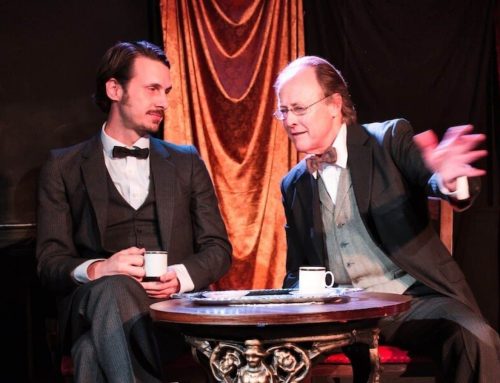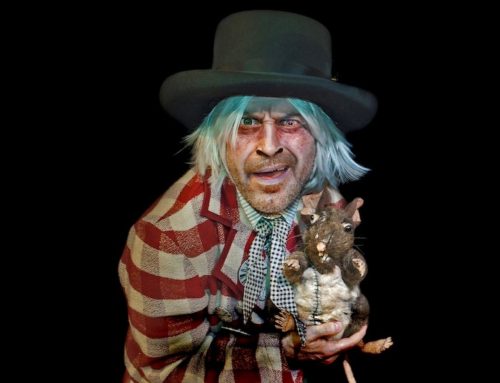Douglas Fairbanks was a groundbreaking figure in early American cinema. Celebrated for his larger-than-life screen presence and athletic prowess, he became one of the most popular actors of the silent film era. Fairbanks’ career waned with the advent of the talkies, but the actor is now remembered, amongst other things, as the inventor of the action movie. “No one could buckle a swash like me,” the character tells us with a vigorous glint in his eye. Paul Stone’s bioplay The King of Hollywood takes us on an anecdote-heavy review of the man’s life and considers, not wholly convincingly, the nature of his relationship with comedian Charlie Chaplin.
Christmas Day. 1977. The ghost of Fairbanks (Gerardo Cabal) sits at a dinner table in a dilapidated London music hall. For 38 years he has been waiting for Chaplin’s spirit (Simon Lawrence) to arrive from the mortal realm. To move on from this purgatory Fairbanks needs someone to “testify they love me”. The star has been worshipped and adored by fans and fellow movie stars. But abandoned by parents, partners, and child he has never truly been loved. The robustly heterosexual Fairbanks confesses “My soulmate was another guy… the one relationship my jealousy didn’t destroy”. Chaplin here is a kind of Charon, the ferryman of Greek myth whose confession of devotion will finally transport Fairbanks’ soul to Elysian Fields. Will Chaplin offer the redemption Fairbanks so desperately seeks?
Stone’s setup is promising enough, but neither Fairbanks’ personality nor the nature of the relationship between the two Hollywood superstars surface convincingly from the narrative fog. The writer gives a faithful account of Fairbanks’ transformation from the ill-disciplined son of “a pathetic drunk bigamist” to a soap salesman (whose sales techniques include munching on the product to demonstrate its purity). Then we track him to Broadway Laertes, philandering movieland royalty, and ultimately the inspiration for comic book hero Batman. Yet the man, who invents movie premiers, does most of his film stunts and marries three times, ultimately feels enigmatic: a monochrome figure in need of colouring in.
Cabal, bedecked in bandana, pencil moustache, and gypsy-hoop earrings makes for an engaging Fairbanks. Lawrence does what he can but is underutilised and under-directed as Chaplin. The comedian emerges as a silent-movie confessor figure offering absolution and forgiveness (and a convenient conduit for extended exposition) rather than a character in his own right. Chaplin lost the inspiration to make more films after Fairbanks died in 1939. One certainly senses unexplored dramatic potential in the duo’s relationship yet Stone’s search for a queer subtext to their connection feels misdirected.
Writer and Director: Paul Stone
More Recent Reviews
Milked. White Bear Theatre.
Written in 2013 and first seen a decade ago in a production at the Soho Theatre, Simon Longman’s slice [...]
Fresh Mountain Air. Drayton Arms Theatre.
Lana Del Rey’s ode to female unity and resilience, God Bless America And All the Beautiful Women In It, [...]
Rodney Black: Who Cares? It’s Working. Lion and Unicorn Theatre.
Rodney Black is a tacky small-time comedian with a venal manager and a taste for nasty misogynism. “I’m a [...]






